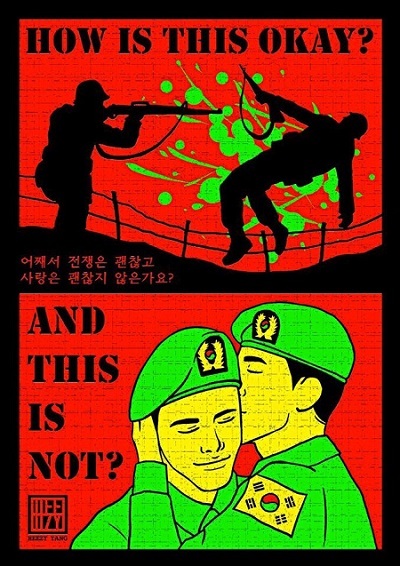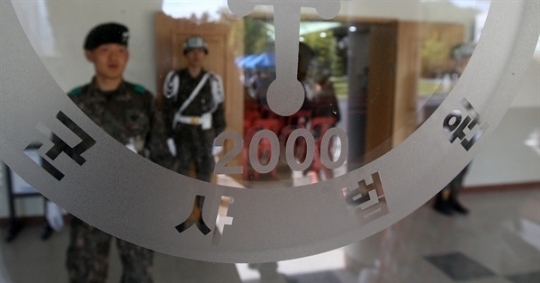Following the military court‘s conviction Wednesday of a gay soldier for having sex, many expatriates living in South Korea reacted with a mixture of shock, disappointment and anger toward what they said was a violation of basic human rights.
“These men are serving their country and their country repays them with prison?” said Amanda Melgarejo Bastos, a 28-year-old English teacher from the United States.
“Seeing how racism and sexism are big issues here, I can’t say I am surprised, but I am still angry about it. Shame on the Korean military,” she said.
The convict, an Army captain whose name was withheld, was sentenced to six months in prison, suspended for a year, for having consensual sex with a same-sex soldier in a private place.
 |
(Heezy Yang) |
He was charged with a violation of the Military Criminal Act, which is punishable by up to two years in prison. The act outlaws sodomy or other “disgraceful acts” in the armed forces regardless of whether there was mutual consent.
“I’m beyond furious. How is this a fair ruling? They are forcing men to serve in the military, but they cannot be themselves -- gay?” said Jacqueline Carrillo, who identifies as bisexual.
In South Korea, serving about two years in the military is mandatory for most able-bodied men to deter aggression from North Korea.
“What’s going to happen to them in jail? Will they be persecuted for being gay, too?” she asked.
The military, as well as conservative and Protestant groups, argue that homosexual acts in the barracks would undermine its readiness and discipline to fight North Korea’s 1.2 million-strong army.
Timothy Gitzen, an activist for Solidarity for LGBT Human Rights for Korea and a Ph.D. candidate in anthropology at the University of Minnesota, said that it was no different from “segregation.”
“Do not be mistaken. This is South Korea -- the place where “the power of the people” can unseat corrupt presidents,” he said. “But it’s state-sanctioned violence against its own people.”
“It is the same argument people would use in the US to talk about segregation in the military between people of color and white soldiers,” Gitzen said. “Soldiers only care about staying alive and finishing their service. The only people who care about it are military officials in power who want to impose their religious world view on the military and the state.”
In protest against the ruling, a group of 10 liberal lawmakers submitted a bill to scrap the controversial gay ban clause in the military criminal act.
“Punishing those having consensual sex outside the barracks is a violation of rights to self-determination and privacy,” said Rep. Kim Jong-dae of the minor Justice Party in a press briefing Thursday. “Sexual orientation is not subject to permission.”
“There are still clauses severely punishing forcible sexual contacts such as rape, so it is groundless fear that the lifting of the military gay ban will help spread sexual crimes.”
 |
(Yonhap) |
After the verdict was delivered Wednesday, human rights groups have strongly condemned the verdict.
“It is a shameful side of South Korea, which has been a member of the United Nations Human Rights Council, that the government labeled an individual as a criminal just because he is gay,” said the Center for Military Human Rights Korea.
Amnesty International called for an end to the “bigoted hunt to root out gay personnel.”
“This unjust conviction should be immediately overturned. No one should be persecuted based on their sexual orientation, activity or gender identity alone. What counts is their service not their sexuality,” said Roseann Rife, East Asia Research Director at Amnesty International.
In April, the military human rights group claimed that Army chief of staff Gen. Jang Jun-gyu ordered a hunt to identify gay military soldiers. The military put up to 50 soldiers on the list and set up fake profiles on dating apps to lure them into outing themselves, it said.
The Korean military denied the allegations, saying it only investigated those involved in a video of two servicemen having sex posted on social media.
Meanwhile, a Taiwanese court on Wednesday ruled in favor of same-sex marriage, paving the way for it to become the first Asian country to legalize same-sex unions.
By Ock Hyun-ju (laeticia.ock@heralcrop.com)





![[Today’s K-pop] Blackpink’s Jennie, Lisa invited to Coachella as solo acts](http://res.heraldm.com/phpwas/restmb_idxmake.php?idx=644&simg=/content/image/2024/11/21/20241121050099_0.jpg)



